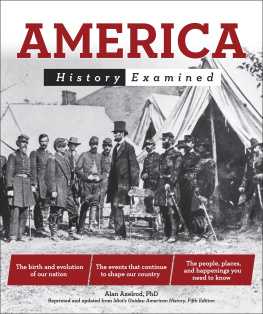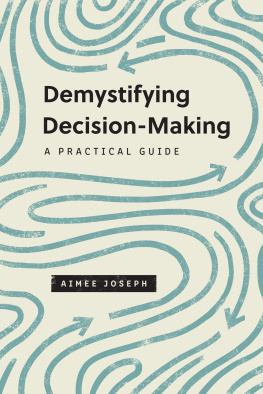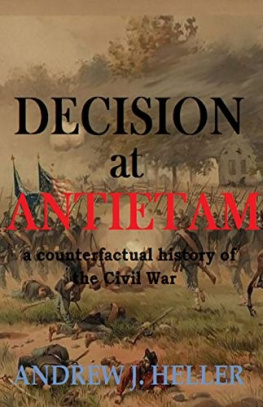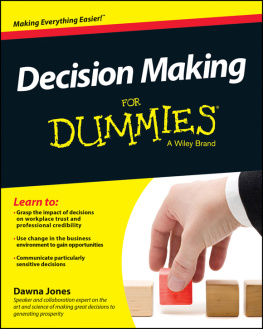P ROFILES
IN
A UDACITY
P ROFILES
IN
A UDACITY
G REAT D ECISIONS AND
H OW T HEY W ERE M ADE
Alan Axelrod

New york / London
www.strlingpublishing.com
STERLING and the distinctive Sterling logo are registered trademarks of
Sterling Publishing Co., Inc.
Library of Congress Cataloging-in-Publication Data Available
2 4 6 8 10 9 7 5 3 1
Published by Sterling Publishing Co., Inc.
387 Park Avenue South, New York, NY 10016
2006 by Alan Axelrod
Distributed in Canada by Sterling Publishing
c/o Canadian Manda Group, 165 Dufferin Street
Toronto, Ontario, Canada M6K 3H6
Distributed in the United Kingdom by GMC Distribution Services
Castle Place, 166 High Street, Lewes, East Sussex, England BN7 1XU
Distributed in Australia by Capricorn Link (Australia) Pty. Ltd.
P.O. Box 704, Windsor, NSW 2756, Australia
Manufactured in the United States of America
All rights reserved
Sterling ISBN-13: 978-1-4027-3282-9 Hardcover
ISBN-10: 1-4027-3282-1
Sterling ISBN-13: 978-1-4027-4531-7 Paperback
ISBN-10: 1-4027-4531-1
For information about custom editions, special sales, premium and
corporate purchases, please contact Sterling Special Sales
Department at 800-805-5489 or specialsales@sterlingpub.com.
For Anita
Who decided to say yes
My thanks to Michael Fragnito and Barbara Berger,
for having the audacity to publish this book.
Contents
T he Rubicon River, near modern Ravenna in northern Italy, is as unimpressive today as it was when Julius Caesar stood on its northern bank in 49 B.C. Small and shallow, it dries up at even the hint of drought. Certainly, it presented no obstacle to the advance of an army. It was just a matter of crossing a little bridge. But as Plutarch, one of Caesars two early biographers, tells us, the great general became full of thought as he approached the river. His mind wavered, and he began to go more slowly and then ordered a halt. Julius Caesar stood on the bank of the little river and for a long time... weighed matters up silently in his own mind, irresolute between... two alternatives.
The Rubicon divided northern ItalyCisalpine Gaul, the large province Caesar controlledfrom Rome, which was governed by the Senate and dominated by Cnaeus Pompeius Magnus, better known as Pompey. Once Caesars ally, Pompey was now his archrival, and he had the law on his side. The Lex Cornelia Majestatis solemnly forbade any Roman general from leading an army out of the province to which he was assigned. This meant, quite simply, that if Caesar and the six thousand men with him crossed the Rubicon, they would bring down upon themselves all the vast legions commanded by Pompey and the Senate of Rome.
To cross the Rubicon would mean civil war, maybe impossible to win and certainly tragic for the nation. But if this was a powerful reason not to cross, there was also a compelling reason not to remain on the northern bank. Inaction would perpetuate a peace that had been dictated by a fatally misgoverned Rome. To remain on the far side of the river, in apparent safety, would sooner or later bring calamity. A state misruled cannot long endure.
BORN ABOUT 100 B.C. into a patrician family on the financial skids, Julius Caesar grew up determined to revive his familys fortunes and to bring distinction, honor, and wealth upon himself. But he also saw that Rome was in deep and deepening trouble. Those who governed it were corrupt and incompetent, in bed with a rapacious class of business tycoons called the equites, or knights, who had grown enormously powerful on the profits of military and other government contracts. The vast majority of Roman citizens and subjects, the peasantry who supplied the manpower of the mighty Roman legions and the labor for everything else, were oppressed and dispossessed by an economic system that barely allowed them a living. Rome and its empire were in perpetual turmoil, convulsed by revolutionary uprisings that alternated with iron-fisted campaigns to quell them. How many more such convulsions could Rome, barbarians pressing at every frontier, endure?
Through guile, boundless courage, military genius, and an advantageous marriage, Caesar became one of three triumvirs (along with Pompey and Marcus Licinius Crassus) ruling Rome and its provinces. His assigned stronghold was Cisalpine Gaul, bounded by the Alps, the Apennines, and the Adriatic. Here Caesar recruited troops for conquests beyond the northwest frontier of the republic. By the year 50 B.C. , he had conquered all of GaulFrance up to the left bank of the Rhineand, three years later, Crassus was knocked out of the triumvirate when, suffering total defeat at the hands of the Parthians, he lost Syria. This left Caesar and Pompey to square off against one another.
They did not have to wait long for a showdown. Caesar was due to resign his provincial governorships and take up a term as consul. Pompey pointed to a law that obliged Caesar to relinquish his army during the interval between the expiration of his term as governor and the commencement of his consulship. During this gap, an unarmed Caesar would be entirely vulnerable to Pompey and other enemies. He therefore lobbied the Senate either to eliminate the interval between offices or allow him to retain his army during it. As the date of expiration drew near, Caesar became impatient and stopped cajoling. He now peremptorily demanded of the Senate that Pompey be obliged to lay down his arms simultaneously with him. Offended by the consuls insolence, the Senators responded that Caesar was to be treated as a public enemy if he refused to submit on whatever date they fixed.
And that was what brought Julius Caesar to the north bank of the Rubicon. To cross it would bring the wrath of Rome thundering down upon him and his men. To cross it would engulf the republic in civil war. But to remain on the northern bank would at best gain nothing and would most likely risk an end to his power. Besides, if it did not destroy Rome, crossing the Rubicon was the best hope of saving it.
According to Plutarch, Caesar stood on the riverbank, discussing his perplexities with his friends who were there. He thought of the sufferings which his crossing the river would bring upon mankind. Then, however, he imagined the fame of the story of it.
Another early biographer, Suetonius, recorded that Caesar remarked to his followers: We may still draw back; but, once across that little bridge, we shall have to fight it out. Caesar stood, in two minds, Suetonius relates, then suddenly caught sight of a man, strikingly noble and of graceful aspect, who played upon a shepherds pipe, played with such captivating beauty that soldiers, including the trumpeters, flocked to him from their posts. The man suddenly seized a trumpet from one of the military musicians, and ran to the river with it. Putting it to his lips, he sounded, with a piercing blast, the Legionnaires call to advance, then boldly crossed to the other side of the river.
Roused from his thoughts, Caesar called out: Let us accept this as a sign from the Gods, and follow where they beckon, in vengeance on our double-dealing enemies. Alea iacta est!
The die is cast!
With that exclamation, Julius Caesar crossed the Rubicon, starting a great civil war that would bring him unprecedented power in the Roman world even as it advanced the frontiers of Rome both in extent and through time. Mired in corruption, Rome had been almost surely doomed. By choosing a course that ended this moribund misrule, Caesar gave to the Roman state, and therefore to Greco-Roman civilization, four more centuries of life in the West and six more in the East, bequeathing to the world a heritage that is more than history. It continues to influence and inform cultures and governments, including that of our own nation. Crossing the Rubicon was, by any measure, a great decision.
Next page














